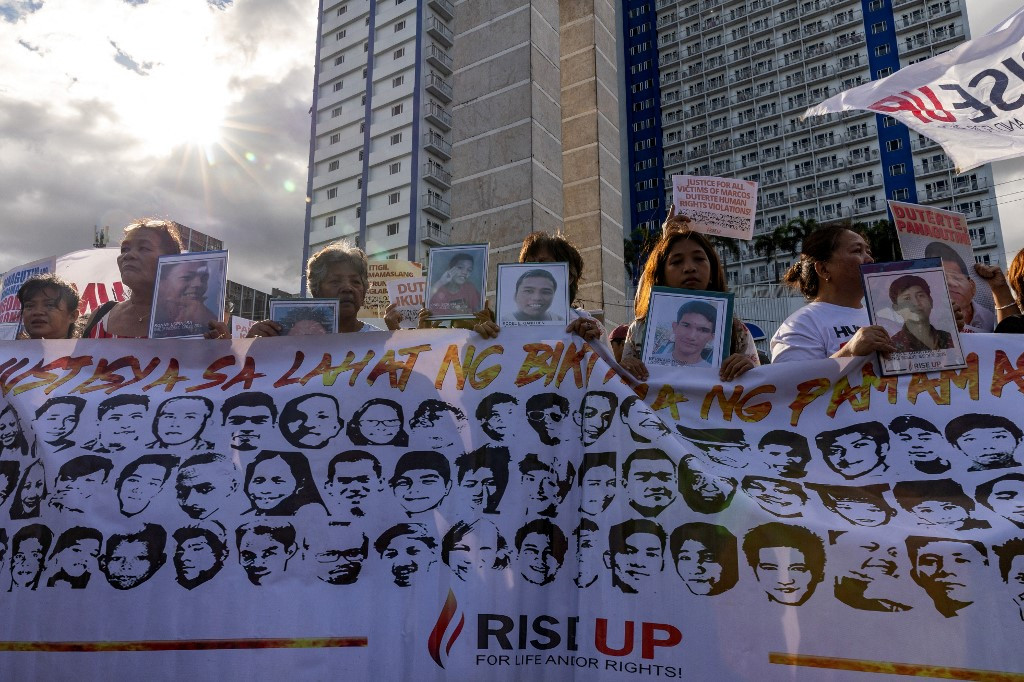Popular Reads
Top Results
Can't find what you're looking for?
View all search resultsPopular Reads
Top Results
Can't find what you're looking for?
View all search resultsThe criminal charges against Rodrigo Duterte
While heavily redacted, the ICC has publicly released the charges it plans to bring against the former president over three separate criminal incidents, signaling that the Philippine people might finally learn of their country's most violent contemporary period.
Change text size
Gift Premium Articles
to Anyone
T
he Document Containing the Charges (DCC) against former Philippine president Rodrigo Duterte has finally been publicly released by the International Criminal Court (ICC). Although many details have been censored, the document still reveals a lot of crucial information.
The charges are not final, because the pretrial chamber of three judges will still have to approve them when the confirmation of charges hearing finally take place. Once approved, the trial, during which witnesses will testify, can then be scheduled to begin.
According to the DCC, “between Nov. 1, 2011 and March 16, 2019, Duterte and his co-perpetrators shared a common plan or agreement to ‘neutralize’ alleged criminals in the Philippines (including those perceived or alleged to be associated with drug use, sale or production) through violent crimes including murder (‘Common Plan’)”.
The DCC goes on to list Duterte’s “co-perpetrators”, although their names have been censored in the document’s public version. One can figure out, however, that there are at least eight names identified as co-perpetrators in addition to “other members of the Philippine National Police and high-ranking government officials”.
These co-perpetrators are not currently charged in the pending case against Duterte, but we will know in the coming months whether or not they will eventually be charged and arrested like the ex-president.
Essentially, the ICC Office of the Prosecutor (OTP) proposes to charge Duterte with three crimes.
First is the crime against humanity of murder for the killings in and around Davao City during Duterte’s term as mayor from 2013 to 2016 (Davao killings). Second is the crime against humanity of murder for the killings of “high-value targets” during Duterte’s presidential term from 2016 to 2017 (Operation Double Barrel killings; high-value targets killings). And third are the crimes against humanity of murder and attempted murder for killings and attempted killings during the barangay clearance operations (Operation Tokhang killings) from 2016 to 2018 (Tokhang killings).
To prove the Davao killings, the OTP will present nine incidents in which 19 people were murdered in Davao City and Davao del Norte. For the high-value target killings, it will present five incidents in which 14 people were murdered in the City of Manila and four other undisclosed localities. For the Tokhang killings, the OTP will present 35 incidents in which 43 people were murdered, while two others were shot at but survived. Of the Tokhang killings, 14 incidents happened in Manila, 18 in Bulacan, one in Quezon City and one in Caloocan City.
All in all, the OTP will undertake to prove a total of 76 murders and two attempted murders. However, the office clarified that “at least hundreds of other murders during the mayoral period, (and) thousands of other murders in the presidential period and other violent crimes” were attributed to Duterte as the mastermind.
In other words, the murders and attempted murders mentioned in the DCC are only representative samples of all the crimes that were attributed to Duterte and his co-perpetrators when they “carried out a widespread and systematic attack against the civilian population in the Philippines”.
Duterte is being charged with masterminding the three sets of crimes mentioned earlier because of his following actions: He designed and disseminated the policy to “neutralize” alleged criminals; he established and oversaw the Davao Death Squad (DDS), described as Davao City Police officers and nonpolice hit men; he instructed and authorized the commission of violent acts against alleged criminals; he provided personnel and other logistical resources, such as weapons, for use in the execution of the crimes; he appointed key personnel to positions that were crucial to the execution of the crimes; and he offered financial incentives and promotions to police officers and hit men to kill alleged criminals.
Other acts attributed to Duterte that link him to the crimes are as follows: He created and maintained a system in which perpetrators knew they would be protected, including promises of immunity and shielding them from investigation and prosecution; he made public statements authorizing, condoning and encouraging the killings of alleged criminals; he authorized state actors to take part in the antidrug campaign and temporarily revoked such authorization, including to placate public outcry; and he publicly named individuals and held up charts from lists of alleged criminals, including so-called high-value targets, some of who were subsequently killed.
The hope is that the preliminary issues raised by the defense, such as Duterte’s mental fitness and the challenge to the ICC’s jurisdiction, can be resolved soon, so the Filipino people can see and hear the details of the most violent period of their contemporary history.
---
The writer is a columnist for the Philippine Daily Inquirer.










